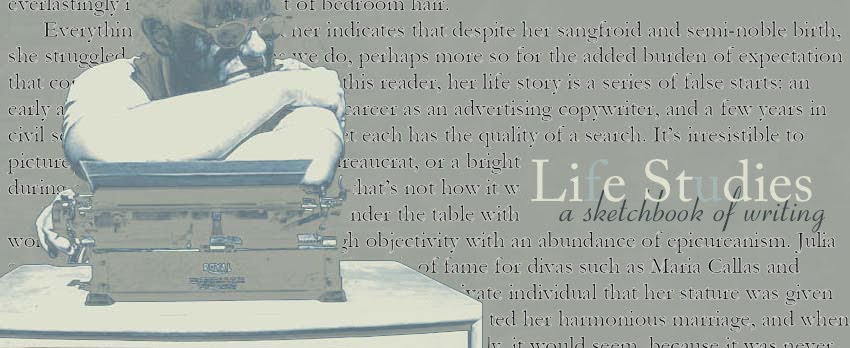My mother—in her beige and tan pencil dresses and Polaroid sunglasses—kept me for a required number of months then consigned me to my grandmother and her two spinster sisters before I was of school age.
Until college, I still spent summers with them, tanning flat on a vinyl chaise lounge and reading almost daily letters from a girl back home. She recommended I read Salem's Lot. She loved me.
My grandmother was in her mid-70s but her two older sisters were well into their 80s, and they had spells.
Spell days were dark days. There was no piano practice, and the cookie baking halted, leaving that dear kitchen in a rare state of scentlessness. Aunt Ada took to her habitual dining room chair—in which she always "listened to" television at night. Yet there she sat at noon, her head resting on her hand or tucked onto her chest as if in prayer.
It was understood they were terrible headaches. Yet to a child they seemed so much more: the visitation of a demon, some grief without respite, even a sort of penalization—for living too joyously, too selflessly.
For winking and giving me the heart of her watermelon wedge on those long July afternoons with the honeysuckle vine just on the other side of the kitchen window screens.
Aunt Mame laid across her mattress in the back bedroom. But instead of reading the dictionary or the Bible—holding the book like an umbrella above her face, her silver-rimmed spectacles like two metal bird's wings in flight from her eyes—she lay motionless and terrified, smelling of Vick's. Composting wood shavings from the factory next door or transplating pachysandra abruptly ceased.
My grandmother entered the room throughout those days with a revolving selection of broths and elixirs. Sometimes, the evening Bible reading was moved into Mame's room. The mantle clock was kept wound so she could enjoy its tones. Her feet were put onto pillows to reduce the edema.
Everyone waited out the spell.
When I was 11, there were no diagnoses, no medical words to translate these betrayals of lungs and stomach. Although the doctor came and went—always addressed by his Christian name—I never heard him say very much. It was as if, in the 1960s, attaining a very old age was itself a frailty, even a sort of arrogance toward God.
But when I was still quite young, the sisters recovered. Aunt Mame took up her shovel again, or inspected a peck of freestone peaches with her thumb and forefinger. She buried her apple skins—the cut sections still clinging together like scarlet bandages—under the tall spruce trees in the middle of the deep yard.
Aunt Ada returned to her letter writing and her ice box cookies with the pecan pushed into the center like the finishing touch of a buttery sculpture.
I am having a spell today as I write this. I just feel lousey, tired and slightly nauseous.
There are still, really, no words for what we suffer in our bodies—our physical biography, the thumb print of our pleasures and pain. The state of our veins and hearts at any given moment—energy and exhaustion, compassion and treachery, memories and terrible foreboding—mix without translation.
We go forward gifted, and flawed.
